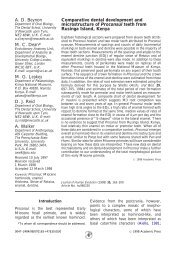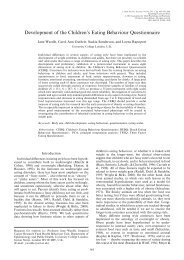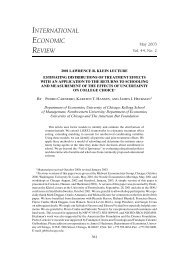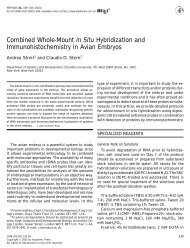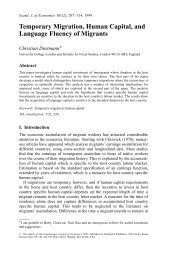The Ambitions of Contract as Promise Thirty Years On ... - UCL
The Ambitions of Contract as Promise Thirty Years On ... - UCL
The Ambitions of Contract as Promise Thirty Years On ... - UCL
Create successful ePaper yourself
Turn your PDF publications into a flip-book with our unique Google optimized e-Paper software.
<strong>Ambitions</strong> <strong>of</strong> <strong>Contract</strong> As <strong>Promise</strong> 24 August 2012 discussion draft: do not quote or reproduce without permission<br />
encouraging a promisor to make the highest and best use <strong>of</strong> his resources, while<br />
awarding the disappointed promisee a money equivalent no greater than the worth<br />
<strong>of</strong> the promised performance. This is the much-mooted argument for the efficient<br />
breach. Related to efficient breach is the doctrine <strong>of</strong> mitigation. Economic<br />
critics <strong>of</strong> <strong>Contract</strong> <strong>as</strong> <strong>Promise</strong> have been known to argue that if the moral<br />
obligation <strong>of</strong> promise really were the b<strong>as</strong>is <strong>of</strong> contract, then insult would not be<br />
added to injury—<strong>as</strong> it is in standard doctrine 29 —by requiring that the victim <strong>of</strong><br />
the breach extend himself to minimize the damage that the promisor h<strong>as</strong> caused<br />
him.<br />
<strong>The</strong>se same instances are deployed against <strong>Contract</strong> <strong>as</strong> <strong>Promise</strong> by those<br />
who criticize standard contract doctrine <strong>as</strong> insufficiently faithful to the morality<br />
<strong>of</strong> promise and <strong>as</strong> meretriciously swayed by (merely) economic arguments to<br />
loosen the rigors <strong>of</strong> promissory morality. <strong>The</strong>y fault <strong>Contract</strong> <strong>as</strong> <strong>Promise</strong> for<br />
being untrue to its own moral premises by apologizing for these departures<br />
from what promissory morality requires. <strong>The</strong> leading critic along these lines is<br />
Seana Shiffrin, who concludes her important article, <strong>The</strong> Divergence <strong>of</strong> <strong>Contract</strong><br />
and <strong>Promise</strong>, 30 by suggesting that the prevalence <strong>of</strong> expectation damages and the<br />
29 Id. § 350.<br />
30 Seana Valentine Shiffrin, <strong>The</strong> Divergence <strong>of</strong> <strong>Contract</strong> and <strong>Promise</strong>, 120 HARV. L. REV. 708 (2007)<br />
[hereinafter Shiffrin, Divergence]. Contra Kraus, Correspondence, supra note 22.<br />
16




